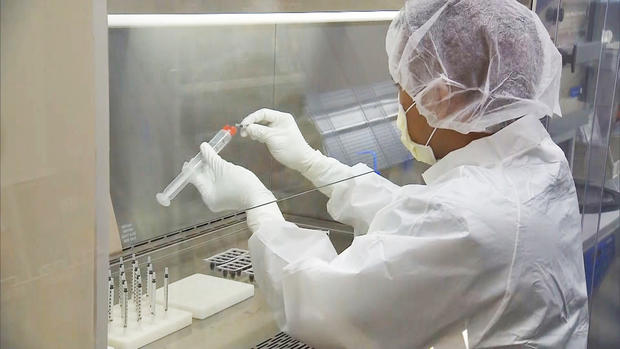12 dead, 137 infected by fungal meningitis
Another fungal meningitis victim has been confirmed, raising the toll to 12 dead and 137 infected in 10 states, the Centers for Disease Control and Prevention reported.
The latest death marks Florida's first victim. A 70-year-old Marion County man who had died in July received a steriod epidural shot from the Florida Pain Clinic and was confirmed to have the disease, according to the Gainesville Sun. CBS station WFOR in Miami reported that all six cases in Florida have been found in Marion County. Gov. Rick Scott told reporters on Tuesday that authorities had contacted nearly 700 of the 1,185 patients who possibly received contaiminated products.
Today's numbers are a slight increase from yesterday. The CDC reported that there had been 119 confirmed cases of meningitis infections and 11 deaths in 10 states on Tuesday.
States with reported infections of fungal meningitis include Florida (six cases including one death), Indiana (15 cases), Maryland (nine cases including one death), Michigan (28 cases including three deaths), Minnesota (three cases), North Carolina (two cases), Ohio (one case), Tennessee (44 cases including six deaths) Virginia (27 cases including one death) and, the newest addition to the list, New Jersey (two cases).
- Husband awaits meningitis test results following wife's death
- Finding meningitis victims before it's too late
- Doctor calls for more regulation amid deadly meningitis outbreak
The outbreak is tied to methylprednisolone acetate steroid injections made by specialty pharmacy New England Compounding Center. After contaminants were discovered in an unopened vial during an inspection at the Framingham, Mass., facility, three lots of single-dose vials of the steroid that were sent to 76 facilities in 23 U.S. states -- in total 17,676 vials -- were recalled.
States that received injections include: California, Connecticut, Florida, Georgia, Idaho, Illinois, Indiana, Maryland, Michigan, Minnesota, North Carolina, New Hampshire, New Jersey, Nevada, New York, Ohio, Pennsylvania, Rhode Island, South Carolina, Tennessee, Virginia, Texas and West Virginia. However, because the company is licensed in all 50 states, there is a possibility that products could have been shipped elsewhere.
Tennessee state health officials told Reuters about 5 percent of patients treated with the tainted medication in Tennessee have contracted meningitis.
The company expanded its recall Saturday to include all other products the company manufactures. Because they only collect drug ingretients and combine or package them into specific doses for specific clients, they aren't subject to FDA regulations. Only the medication itself is under the FDA's jurisdiction.
Because of the lax regulations, U.S. House and Senate lawmakers from both parties on Tuesday asked federal health officials for briefings on the fungal meningitis outbreak, Reuters reported. Their investigation could lead to harsher rules against compounding companies.
Fungal meningitis is not contagious, health officials note. The disease can be treated with high-dose intravenous antifungal medications. The earlier people get treated, the more likely they are to have better outcomes, officials said.
The source of the fungus has not yet been identified, and the cause of infections in the other patients is still being assessed, according to the CDC.
Infected patients have reported mild symptoms, including slight weakness, slightly worsened back pain or even a mild headache, the CDC said. Patients have had symptoms generally starting from one to four weeks after receiving the injection. Several patients also suffered strokes that are believed to have been caused by the infection.
Those who had an epidural steroid injection since May 21 should contact their doctor as soon as possible if they are experiencing the previously mentioned symptoms in addition to fever, sensitivity to light, stiff neck, slurred speech or increased pain and redness at the injection site. Concerned patients could also check with their doctor if they have any questions on the type of medication used in their procedure.
Dr. William Schaffner, an infectious disease specialist who has been tracking the outbreak at the Vanderbilt University Hospital, told the CBS Evening News that the majority of people who received the injection probably won't get sick.
"If there is a silver lining, it's that apparently many people were inoculated but the attack rate is very small," he said. "It's really about 1 percent or less.
The CDC has more information on the meningitis outbreak.

